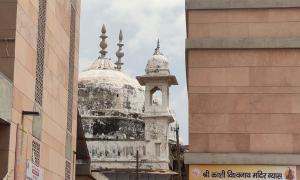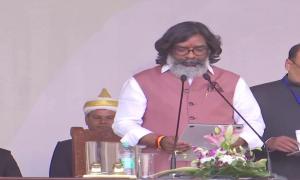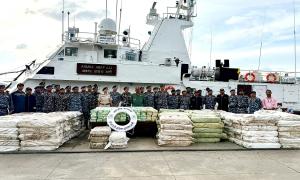Leaders of the seven nations that comprise the regional grouping sent out mixed signals on the inclusion of Afghanistan, China and possibly Japan into their fold, and left it till the final day Sunday to arrive at a decision.
While India and Pakistan support the inclusion of Afghanistan, India wants 'the modalities' of such admission to be formed before giving China observer or dialogue partner status.
The seven leaders flew into Dhaka on Saturday, tying up the airspace over Dhaka, which had a domino delay effect on passenger flights connecting to or overflying the city.
They comprised Prime Ministers Manmohan Singh of India, Khaleda Zia of Bangladesh, Shaukat Aziz of Pakistan, Lyonpo Sangay Ngedup of Bhutan, Presidents Abdul Gayoom of the Maldives and Chandrika Bandaranaike Kumaratunga and Nepal's King Birendra.
The city of Dhaka, which officially has a population of close to seven million, wore a festive yet deserted look, with the various security services declaring a virtual curfew in the region. The empty roads leading to and from the conference venues and the main streets likely to be traversed by the delegates were bedecked with lights and placards welcoming them and lauding the SAARC spirit.
On Saturday morning, the seven leaders laid wreaths at the National Martyrs Memorial and unveiled a plaque and paid their respects at the mazar of former President Ziaur Rahman. Then they assembled at the state of the art China Bangladesh Friendship Conference Center for the opening session.
After inaugurating the summit and before handing over the chair to Bangladesh Prime Minister Khaleda Zia, Pakistan Prime Minister Shaukat Aziz presented the first SAARC award posthumously to former Bangladesh President Zia-ur Rahman.
Zia, who was Khaleda Zia's husband, played a key role in the formation of SAARC 20 years ago, and his eldest son Tariq Rahman received the award on his father's behalf amidst much applause from the gathering.
All the leaders then spoke about the need to tackle terrorism and condoled the death and destruction caused by the recent earthquake in Kashmir and the earlier tsunami, and stressed the need to forge a more satisfying relationship among the member states.
During the afternoon, Prime Minister Manmohan Singh had a number of bilateral meetings. The first was with Bangladesh Prime Minister Khaleda Zia, and the discussions centred on SAARC. "The prime minister drew attention to the fact that we were returning to the birthplace of SAARC, that Bangladesh had made a very major contribution to SAARC and said he very much looked forward to Prime Minister Zia's leadership of the association," foreign secretary Shyam Saran said later Saturday evening.
"On bilateral issues, the prime minister conveyed to her that India wanted the very best for Bangladesh, reassured her that for India, any government which was chosen by the people of Bangladesh is the government that India will deal with for the pursuit of our common objectives."
He conveyed that a prosperous Bangladesh is in India's interests, and that we are prepared to work together with her and Bangladesh to sort out any outstanding issues in a constructive spirit of friendship, Saran said.
Prime Minister also met Sri Lankan President Chandrika Kumaratunga. The prime minister conveyed to her that she had made a very major contribution both to India Sri Lanka relations during the 11 years that she has been in power, and that she would continue to be welcome as a statesman whose voice would always be heard with respect in our region, Saran said.
He assured her that India was committed to supporting in any manner possible Sri Lanka's economic development and security.
During her speech earlier at the opening ceremony, Kumaratunga had pointed out that the "India Sri Lanka free trade agreement had proved a lot of doomsayers wrong," said Saran.
Not just showing that there was a huge increase in the volume of trade, but "...more than that, the trade imbalance between the two countries had significantly changed in favor of Sri Lanka,' Saran said. 'I think there is a message in that for our other neighbouring countries."
Singh also met Maldives President Gayoom. "The prime minister said there were no issues between our two countries, the relations were excellent. He complimented president Gayoom on the democratic reforms that he was undertaking in Maldives, and wished him all the success. They also briefly touched upon various areas of cooperation that the two countries were pursuing,' said Saran.
Singh then met Pakistan Prime Minister Shaukat Aziz. "This was an opportunity for the two leaders to exchange views on the aftermath of the earthquake. Aziz thanked India and its people for the manner in which they had responded to this tragedy by expressing solidarity with the people of Pakistan, by making available relief material, and the fact that at the Geneva conference India had announced further assistance of $25 million."
They briefly talked about the opening of the five points along the LoC, welcomed the fact that the third point was opened and the remaining ones will be opened in the subsequent days.
The prime minister also expressed the view that in taking the peace process forward, in addressing what Pakistan describes as the 'trust deficit' between the two nations, it was very important that we were not deflected by the kind of violent events that continue to take place.
Assassination attempts continue to take place, infiltration continues to take place, and this is something that has an impact on public opinion in India, Singh told Aziz.
"Can we take this process forward by demilitarisation? There is no question of demilitarisation, unless a stop is put to the kind of terrorism and violent acts," asserted Saran.
"And why only LoC/India-Pakistan relations that should reach a point of trust?" the foreign secretary said. "We are looking at a much broader relationship."
Also read:








More from rediff